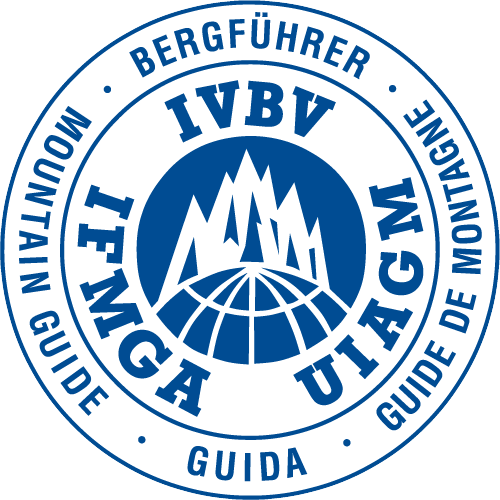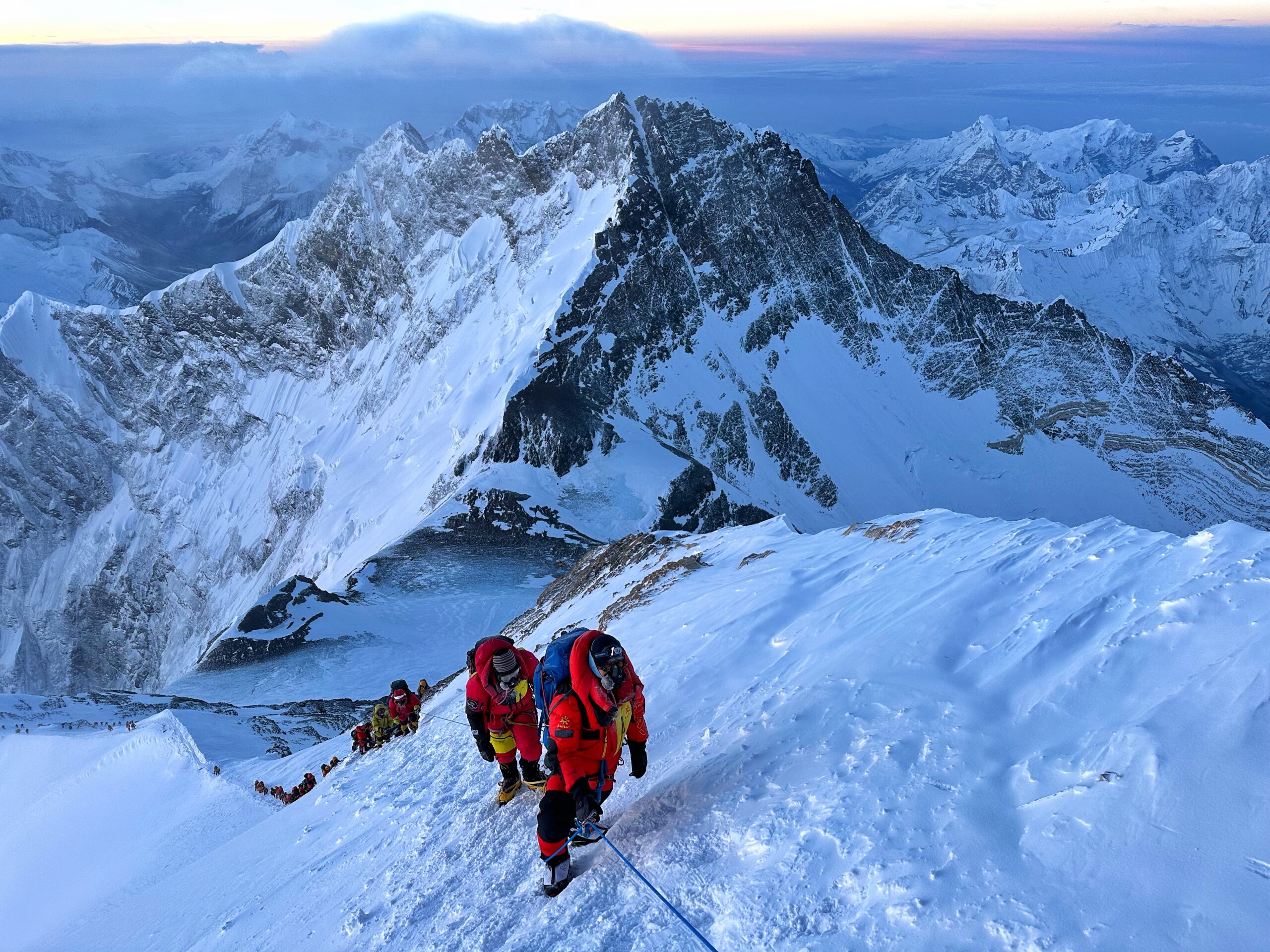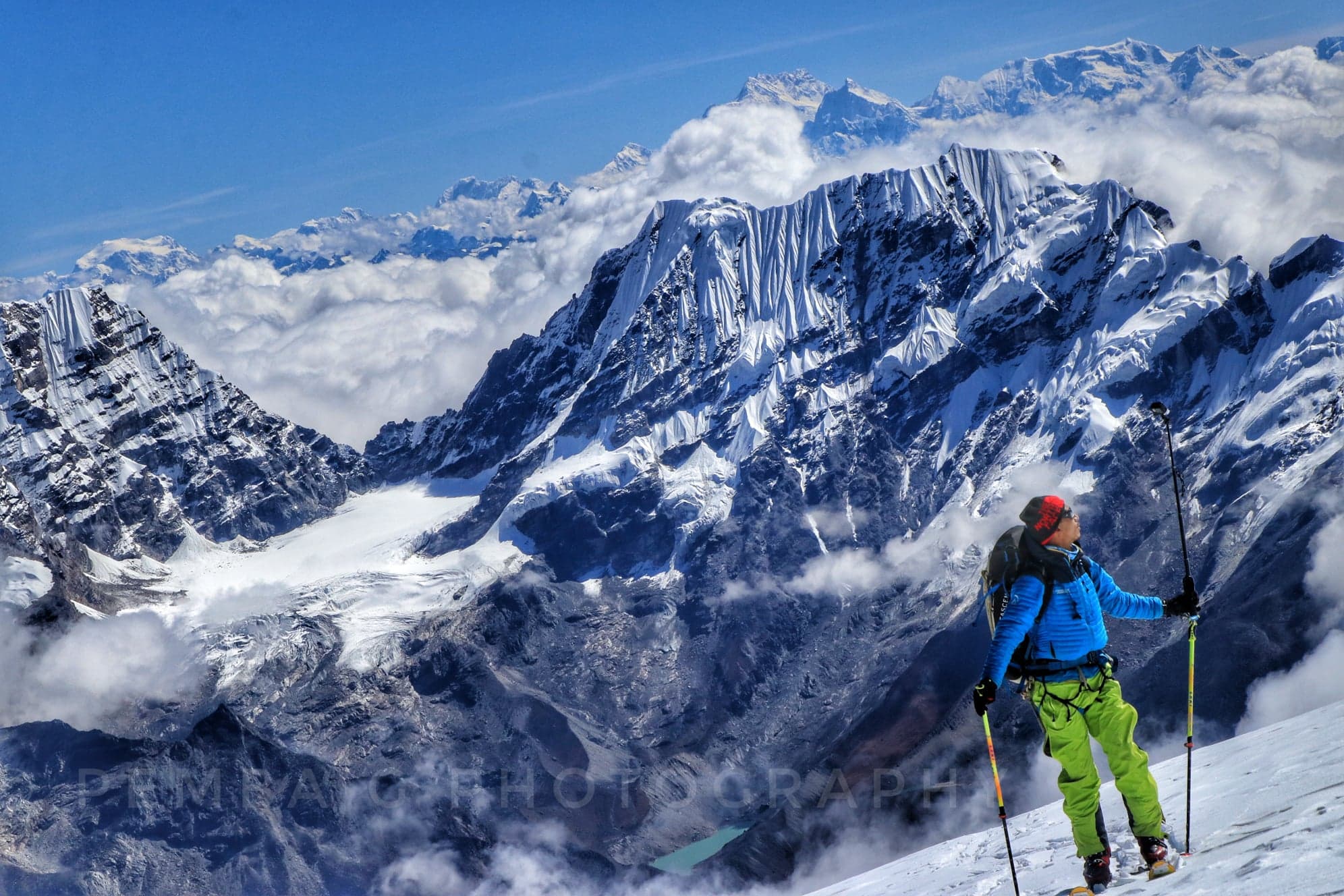

Our team is here to support you 24/7. Please feel free to provide your queries. You will get response within few minutes.

Start $49,950 (With Sherpa Support only) & Start $57,500 (With IFMGA Guide Support)



Everest is the highest mountain in the world at an elevation of 8848.86 meters above sea level. It lies on the Nepal-China border in the Solukhumbu district. Nepal shares the southwest face of Everest while the north and east faces are in Tibet, China. Everest is surrounded by high mountains such as Lhotse, Pumori, Nuptse, Lho La, Sartse, Changtse, and so on.
Climbing Everest requires a good deal of high-altitude climbing experience. This is why most Everest expeditions start with smaller peaks of 6000, 7000, and even other 8000-meter peaks. There have been approximate ~10,000+ summits from Nepal and China combined.
Everest was summited for the first time in 1953 May 29 by Tenzing Norgay and Edmund Hillary as part of a British expedition. There have been multiple records and also a few tragedies on Everest. The Everest expedition passes through the Khumbu region which incorporates some of the highest settlements in the world. The trek up to Everest base camp is an exciting experience, moving through the natural and cultural wonders.
Rapid Expedition generally refers to a climbing style that aims to summit a mountain in a shorter period of time compared to traditional climbing methods. It involves minimizing time spent in the dangerous Khumbu icefall, a challenging section of the mountain. This style often includes pre- acclimatization hypoxic training, the use of supplemental oxygen, and other strategies to ascend faster and reduce time spent at high altitudes. It should only be attempted by experienced climbers who are very familiar with the mountain.
The Rapid Everest Expedition is ideal for climbers with limited time but extensive mountaineering experience, offering a swift yet safe and supported path to the summit of Everest, blending innovation with the timeless challenge of conquering the 8000ers peak.

27 days Climbing / (SKILL LEVEL: extreme)
Day 1: Arrival in Kathmandu
Upon arrival in Kathmandu, you will be warmly welcomed by our team and transferred to your hotel. The bustling city of Kathmandu offers a unique blend of cultural heritage and modern amenities. After settling in, you can explore the vibrant streets of Thamel, known for its lively atmosphere and numerous shops. In the evening, we will gather for a welcome dinner where you will meet your fellow climbers and receive a detailed briefing about the expedition. This day allows you to acclimate to the local environment and prepare mentally and physically for the challenging journey ahead.
Day 2: Heli Flight from Kathmandu to Pheriche
Today, we will take an exhilarating helicopter flight from Kathmandu to Pheriche, covering around 200 km in the air. The flight offers breathtaking aerial views of the Himalayan ranges, including stunning peaks like Everest, Lhotse, and Ama Dablam. Upon landing in Pheriche, we will settle into our lodge. Pheriche is a small village situated in a picturesque valley, surrounded by towering mountains and lush landscapes. The altitude gain is significant, so we will spend the rest of the day resting and taking a short hike around the village to aid acclimatization. The serene environment and panoramic mountain views make this a perfect place to start our high-altitude journey.
Day 3: Rest Day at Pheriche (Short Hiking around Pheriche)
A rest day in Pheriche is essential for acclimatization. Today, we will take a short hike around the village to help our bodies adjust to the altitude. Pheriche is nestled in a wide valley, providing stunning views of the surrounding peaks. We can explore the local area, visit the Himalayan Rescue Association’s clinic, and learn about high-altitude medicine. The landscape is dotted with stone walls and yaks grazing in the fields. This hike allows us to enjoy the natural beauty of the region and prepare for the trek ahead while minimizing the risk of altitude sickness.
Day 4: Trek from Pheriche to Lobuche
Our trek from Pheriche to Lobuche covers a distance of 8 km and takes approximately 5-6 hours. The trail ascends gradually, offering spectacular views of the Himalayas. We pass through alpine meadows and cross glacial moraines. The terrain becomes more rugged as we approach Lobuche, with towering peaks surrounding us. We will pass memorials for climbers who lost their lives on Everest, a poignant reminder of the mountain’s
challenges. Upon reaching Lobuche, we will settle into our lodge and rest, preparing for the higher altitudes ahead. The panoramic views of Nuptse, Lhotse, and Pumori provide a dramatic backdrop to our journey.
Day 5: Rest Day in Lobuche
Today is a rest day in Lobuche, which will allow us to acclimate to the higher altitude. Lobuche is a small settlement located on the edge of the Khumbu Glacier, surrounded by imposing peaks. We can take short hikes around the area to help our bodies adjust while enjoying the stunning mountain scenery. This day is crucial for ensuring our physical readiness for the climb to Lobuche High Camp and the subsequent summit push. The rest day provides an opportunity to relax, hydrate, and enjoy the breathtaking views of the Himalayan giants that surround us.
Day 6: Trek from Lobuche to Lobuche High Camp
We trek from Lobuche to Lobuche High Camp, covering a distance of 5 km in 4-5 hours. The trail becomes more challenging, with steeper ascents and rocky terrain. As we climb higher, the landscape transforms into a barren, icy expanse. The high camp is located at an elevation of 5,250 meters, offering closer views of the towering peaks around us. We set up our tents and prepared for the summit attempt. The high altitude requires careful acclimatization and preparation. This camp serves as a strategic point for the final ascent, providing a stunning vantage point of the surrounding mountains.
Day 7: Summit Day and Descent to Lobuche
Today is the most challenging and rewarding day as we push for the summit of Lobuche East at 6,090 meters. The climb involves navigating steep sections, ice, and rock. Reaching the summit offers breathtaking panoramic views of Everest, Lhotse, Nuptse, and the Khumbu Glacier. After celebrating our achievement, we descend back to Lobuche High Camp and continue to Lobuche. The descent requires careful navigation to ensure safety. This day marks a significant milestone in our expedition, showcasing the stunning beauty of the Himalayas from a lofty vantage point.
Day 8: Trek from Lobuche to Everest Base Camp
We trek from Lobuche to Everest Base Camp, covering a distance of around 6-7 km in 4-5 hours. The trail takes us through the Khumbu Glacier, with its rugged terrain and icy formations. As we approach base camp, the views of Everest and surrounding peaks become more spectacular. Everest Base Camp, situated at 5,364 meters, is a bustling hub of activity during the climbing season. We settled in already set up tents into the base camp environment, surrounded by climbers from around the world. This iconic location offers a unique atmosphere and breathtaking views of the majestic Himalayan peaks.
Day 9: Rest and Puja Ceremony at Base Camp
Today is a rest day at Everest Base Camp to help us acclimatize and prepare for our upcoming climbs. We will take part in a traditional Sherpa puja ceremony, led by the base camp’s Buddhist monks, to seek blessings from the mountain gods for a safe and successful expedition. This ceremony involves offerings, prayers, and the raising of prayer flags. It provides us with a deeper understanding of the spiritual significance of mountaineering in Nepal. The rest of the day will be spent relaxing, hydrating, and enjoying the unique environment of the base camp.
Day 10: Rest and Training Day at Base Camp
Another rest day at base camp will be dedicated to training and acclimatization. We will practice climbing techniques, including the use of fixed ropes, crampons, and ice axes. This training is crucial for ensuring our safety and proficiency during the higher altitude climbs. Additionally, the base camp provides an excellent environment for honing our skills and preparing for the challenging ascent ahead. We will also use this day to rest and recover, ensuring we are physically and mentally prepared for the demanding journey to higher camps.
Day 11: Training Day and Hike to Pomori Camp 1
Today, we will hike from base camp to Pomori Camp 1, which is located at 5,700 meters. This 6 km hike will take approximately 6-7 hours and serve as an acclimatization and training exercise. The trail involves steep ascents and technical sections, providing an opportunity to practice our climbing skills. Reaching Camp 1 will offer stunning views of the surrounding peaks and glaciers. After spending some time at Camp 1, we will descend back to base camp. This hike will help us acclimate to the higher altitude and prepare us for the upcoming climbs.
Day 12: Rest and Preparation for Camp Rotation
A rest day at base camp is vital for recovery and preparation for the upcoming camp rotations. We will use this day to organize our gear, review our climbing strategy, and ensure we are well-rested. The base camp environment allows us to relax and enjoy the camaraderie of fellow climbers. Hydration, nutrition, and mental preparation are crucial as we get ready for the challenging ascent to Camp 1 and beyond. This day is essential for ensuring our readiness for the high-altitude climbs and the ultimate summit push.
Day 13: Climb to Camp 1 from Base Camp
Today, we will make our first ascent to Camp 1, reaching an elevation of 6,065 meters. The climb involves navigating steep, icy sections and using fixed ropes. This ascent prepares us for the higher camps and the summit push. We will spend the night at Camp 1, experiencing the high-altitude environment and ensuring our bodies are well-adjusted for the climb to Camp 2. The overnight stay at this altitude is crucial for acclimatization and builds our readiness for the final ascent.
Day 14: Climb to Camp 2 from Camp 1
Today’s climb will take us from Camp 1 to Camp 2, located at 6,400 meters. The route involves technical climbing and traversing steep sections, requiring careful navigation and teamwork. Reaching Camp 2 marks a significant milestone in our expedition, as we acclimate at a higher altitude and prepare for the summit push. We will return to Camp 1 after spending some time in Camp 2.
Day 15: Climb from Camp 1 to Camp 2 and Stay Overnight
Today, we will again climb from Camp 1 to Camp 2 and stay overnight. This is crucial for building our readiness for the final stages of the climb. We will review our strategy and gear, making any necessary adjustments. The environment at Camp 2 provides stunning views of the surrounding peaks and glaciers, reinforcing our motivation for the summit push.
Day 16: Climb to Camp 3 and Descend Back to Camp 2
Today, we will make a challenging ascent to Camp 3, located at 7,200 meters. The climb involves navigating steep, icy sections and using fixed ropes. Reaching this altitude is a significant achievement and offers breathtaking views of the Himalayas. After spending some time at Camp 3, we will descend back to Camp 2 for the night. This climb will help us acclimate to the higher altitude and prepare us for the final push to the summit. The descent to Camp 2 will allow us to rest and recover in a slightly lower, but still high-altitude environment.
Day 17: Descend Back to Base Camp
We descend from Camp 2 back to base camp, retracing our steps through the rugged terrain. The descent is challenging but necessary for recovery and preparation for the final summit push. Returning to base camp allows us to rest, hydrate, and regain our strength. The familiar environment of the base camp provides a sense of comfort and motivation as we prepare for the final stages of our expedition. This day is crucial for ensuring we are physically and mentally ready for the summit attempt.
Day 18: Rest Day in Base Camp
A rest day at base camp is essential for recovery and preparation for the final summit push. We use this day to rest, hydrate, and ensure our gear is in top condition. The base camp environment allows us to relax and enjoy the camaraderie of fellow climbers. Hydration, nutrition, and mental preparation are crucial as we get ready for the demanding ascent to the summit. This day is vital for ensuring our readiness for the high-altitude climbs and the ultimate summit push.
Day 19: Rest Day and Preparation for Final Everest Climbing
Another rest day at base camp is dedicated to final preparations for the summit push. We review our climbing strategy, organize our gear, and ensure we are well-rested. The base camp environment provides a supportive atmosphere, with climbers sharing their experiences and motivating each other. This day is crucial for ensuring our physical and mental readiness for the ultimate challenge. Hydration, nutrition, and mental focus are key as we prepare for the ascent to the summit of Everest.
Day 20: Climb Camp 1 from Base Camp
Today, we make our ascent to Camp 1, reaching an elevation of 6,065 meters. The climb involves navigating steep, icy sections and using fixed ropes. This ascent prepares us for the higher camps and the summit push. We spend the night at Camp 1, experiencing the high-altitude environment and ensuring our bodies are well-adjusted for the climb to Camp 2. The overnight stay at this altitude is crucial for acclimatization and builds our readiness for the final ascent.
Day 21: Climb Camp 2 from Camp 1
Today’s climb takes us from Camp 1 to Camp 2, located at 6,400 meters. The route involves technical climbing and traversing steep sections, requiring careful navigation and teamwork. Reaching Camp 2 marks a significant milestone in our expedition, as we acclimate at a higher altitude and prepare for the summit push. We spend the night at Camp 2, resting and adjusting to the thin air and cold temperatures. The high-altitude environment requires careful management of our energy and resources.
Day 22: Climb Camp 3 from Camp 2
We make a challenging ascent from Camp 2 to Camp 3, located at 7,200 meters. The climb involves navigating steep, icy sections and using fixed ropes. Reaching this altitude is a significant achievement and offers breathtaking views of the Himalayas. We spend the night at Camp 3, resting and acclimatizing for the final push to Camp 4. The environment at Camp 3 is demanding, and careful management of our resources is crucial for success.
Day 23: Climb Camp 4 from Camp 3
Today’s climb takes us from Camp 3 to Camp 4, located at 7,920 meters. The route involves technical climbing and traversing steep sections, requiring careful navigation and teamwork. Reaching Camp 4 marks a critical stage in our expedition, as we prepare for the final summit push. We spend the night at Camp 4, resting and acclimatizing for the summit attempt. The high-altitude environment is extremely challenging, and careful management of our energy and resources is essential.
Day 24: Summit Push and Descent to Camp 2
Today is the culmination of our expedition as we make the final push to the summit of Everest, standing at 8,848.56 meters. The climb involves navigating steep, icy sections and using fixed ropes. Reaching the summit offers a sense of achievement and breathtaking views of the surrounding peaks. After celebrating our success, we descend back to Camp 2. The descent requires careful navigation and management of our energy. This day marks the pinnacle of our expedition, showcasing the stunning beauty of the Himalayas from the highest point on Earth.
Day 25: Descend to Base Camp and Helicopter Flight to Kathmandu
We will descend from Camp 2 back to base camp, retracing our steps through the rugged terrain. The descent is challenging but necessary for recovery and preparation for the helicopter flight back to Kathmandu. Upon reaching base camp, we will celebrate our success and board a helicopter for the flight to Kathmandu, covering over 200 km in approximately 1 hour and 30 minutes. The flight offers breathtaking aerial views of the Himalayas, providing a fitting end to our expedition. Arriving in Kathmandu, we will transfer to our hotel for a well-deserved rest and celebration of our achievement.
Day 26: Extra Day
An extra day is allocated for any unforeseen delays or additional rest needed. This day provides flexibility in the schedule, ensuring we can complete the expedition safely and successfully. It also allows for additional acclimatization if necessary. We will use this day to relax, explore Kathmandu, or make any final preparations for our departure. The extra day is an important buffer in the itinerary, accommodating any unexpected challenges that may arise.
Day 27: International Departure
Today marks the end of our expedition as we prepare for our international departure. After a final breakfast in Kathmandu, we will transfer to the airport for our flight home. This expedition has been a journey of physical and mental endurance, offering stunning views, cultural experiences, and personal achievements. The memories and experiences gained during this expedition will last a lifetime. We bid farewell to Nepal, taking with us the sense of accomplishment and the camaraderie built with our fellow climbers. Safe travels, and we hope to see you on another adventure soon!
Note: Before booking your international arrival and departure flight, please keep a few extra days between your flight schedule in case of natural, political, or legal disturbances during your trip.
The Everest expedition with Lobuche Peak is undoubtedly challenging. It requires a certain set of gear and equipment. Here is a list of gear and equipment to bring for the trip.